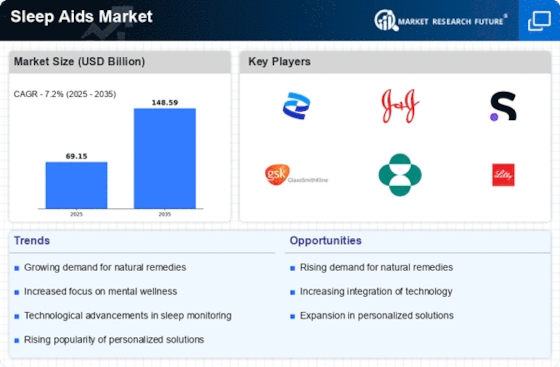Aging Population and Sleep Needs
The demographic shift towards an aging population is significantly influencing the Sleep Aids Market. Older adults often face unique sleep challenges, including changes in sleep architecture and increased prevalence of chronic health conditions that disrupt sleep. As the global population aged 65 and above continues to expand, the demand for sleep aids tailored to this demographic is expected to rise. Reports indicate that individuals in this age group are more likely to seek medical advice for sleep issues, thereby driving the market for both prescription and non-prescription sleep aids. This trend suggests that the Sleep Aids Market must adapt to meet the specific needs of older consumers, potentially leading to innovations in product formulations and marketing strategies.
Growing Awareness of Sleep Hygiene
There is a notable increase in public awareness regarding the importance of sleep hygiene, which is positively impacting the Sleep Aids Market. Educational campaigns and health initiatives are emphasizing the role of good sleep practices in overall well-being. As consumers become more informed about the detrimental effects of poor sleep, they are more inclined to invest in sleep aids that promote better sleep hygiene. This shift is reflected in the rising sales of products such as sleep masks, white noise machines, and herbal teas designed to enhance sleep quality. The Sleep Aids Market is likely to benefit from this trend, as consumers actively seek out solutions that align with their newfound understanding of sleep health.
Increasing Prevalence of Sleep Disorders
The rising incidence of sleep disorders, such as insomnia and sleep apnea, is a primary driver of the Sleep Aids Market. According to recent estimates, nearly 30% of adults experience some form of sleep disturbance, which has led to a growing demand for effective sleep solutions. This trend is further exacerbated by lifestyle factors, including increased stress levels and sedentary habits. As awareness of sleep health continues to grow, consumers are actively seeking remedies that can enhance their sleep quality. Consequently, the Sleep Aids Market is witnessing a surge in product offerings, ranging from over-the-counter medications to herbal supplements, catering to diverse consumer needs. This increasing prevalence of sleep disorders is likely to sustain market growth in the foreseeable future.
Rising Demand for Natural and Organic Products
The increasing consumer preference for natural and organic products is a significant driver of the Sleep Aids Market. As individuals become more health-conscious, there is a growing inclination towards sleep aids that are perceived as safe and free from synthetic ingredients. This trend is evident in the rising popularity of herbal supplements, essential oils, and other natural remedies that promote relaxation and sleep. Market data suggests that sales of natural sleep aids have seen a substantial increase, reflecting a shift in consumer behavior. The Sleep Aids Market must continue to adapt to this demand for natural solutions, potentially leading to the development of innovative products that align with consumer values.
Technological Advancements in Sleep Monitoring
Technological innovations in sleep monitoring devices are reshaping the Sleep Aids Market. Wearable technology, such as smartwatches and fitness trackers, now includes features that monitor sleep patterns and provide insights into sleep quality. This data-driven approach empowers consumers to make informed decisions about their sleep habits and the products they choose to use. As these technologies become more sophisticated, they are likely to drive demand for complementary sleep aids that enhance the overall sleep experience. The integration of technology into sleep solutions not only appeals to tech-savvy consumers but also fosters a more personalized approach to sleep health, potentially expanding the market further.


















Leave a Comment